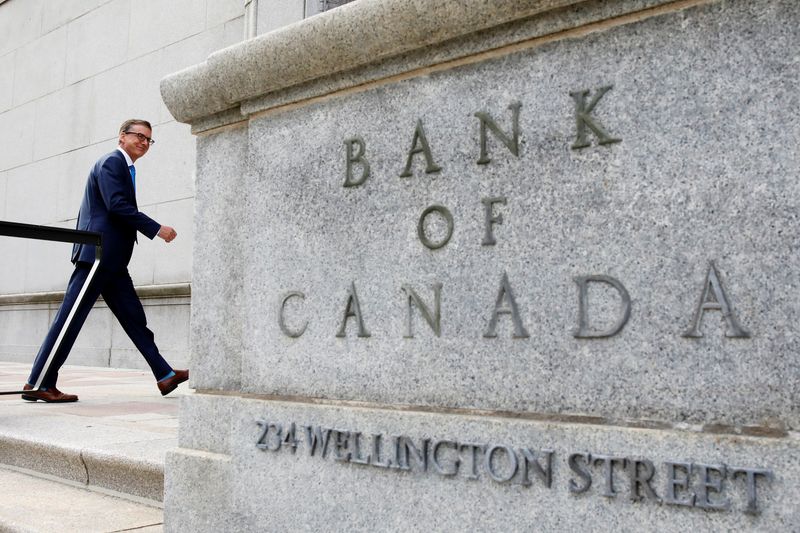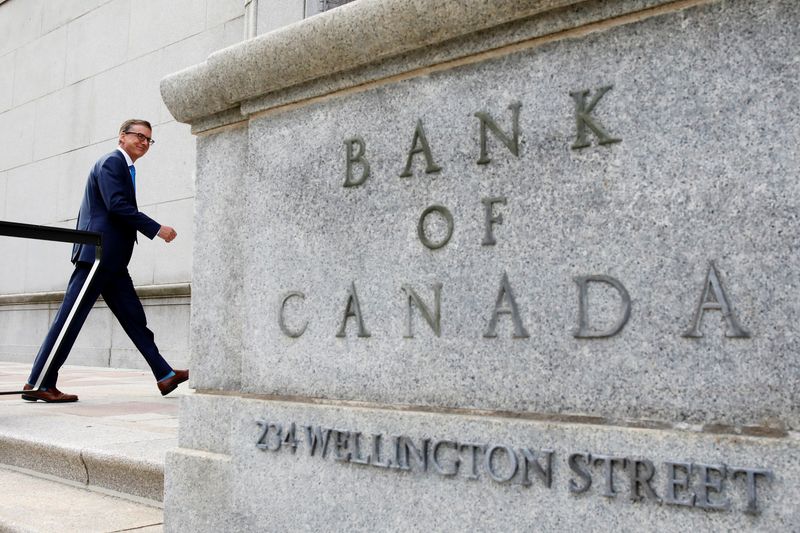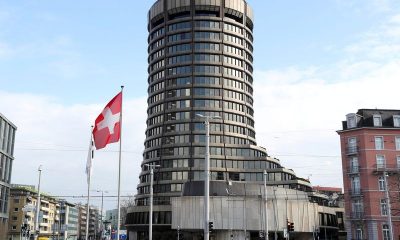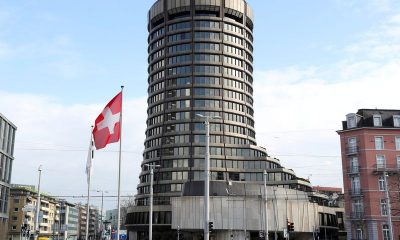Economy
Bank of Canada says rates may now be at peak, excess demand now gone


© Reuters. FILE PHOTO: Governor of the Bank of Canada Tiff Macklem walks outside the Bank of Canada building in Ottawa, Ontario, Canada June 22, 2020. REUTERS/Blair Gable/File Photo/File Photo
By Steve Scherer and David Ljunggren
OTTAWA, Nov 22 (Reuters) – Bank of Canada Governor Tiff Macklem on Wednesday said interest rates might be at their peak, given that excess demand has vanished and weak growth is expected to persist for many months.
The Bank of Canada (BoC) – seeking to control soaring inflation – hiked rates 10 times between March of last year and July 2023, pushing them up to a 22-year high of 5.00%. The inflation rate, which spiked to more than 8% last year, eased to 3.1% in October but is still above the bank’s 2% target.
“This tightening of monetary policy is working, and interest rates may now be restrictive enough to get us back to price stability,” Macklem told the Saint John Region Chamber of Commerce in the Atlantic province of New Brunswick (NYSE:).
“We expect the economy to remain weak for the next few quarters,” he added. “The excess demand in the economy that made it too easy to raise prices is now gone.”
Macklem reiterated that the bank was prepared to raise rates again if needed.
While Macklem told CBC in an interview late last month that rates might have peaked, his remarks on Wednesday marked the first time he has said formally that borrowing costs could be high enough.
His dovish comments are in line with predictions from analysts and money markets that the bank’s next move will be to cut rates by the middle of next year.
But when the BoC’s policy setting governing council last met and announced on Oct. 25 that rates would remain on hold, some members thought another increase in borrowing costs would be needed, according to a summary of their deliberations.
Macklem spoke a day after the government released its Fall Economic Statement, which included new spending measures aimed at providing more affordable housing. It said deficit spending would be much higher than previously forecast in coming years, with debt coming down more slowly.
In recent months, Macklem has said monetary and fiscal policy should be rowing in the same direction to bring down inflation.
In his speech on Wednesday, Macklem recognized the impact of restrictive monetary policy.
“Higher interest rates are squeezing many Canadians, but these rates are relieving price pressures,” Macklem said.
“To return to low inflation and stable growth in the years ahead, we need these higher interest rates and slow growth in the short term,” he added.
On Nov 9, the bank said the era of super-low interest rates was likely over and warned businesses and households to plan for higher borrowing costs than they have been used to in recent years. Some 60% of mortgage holders have yet to renew their home loans at higher rates, the BoC says.
Economy
Russian central bank says it needs months to make sure CPI falling before rate cuts -RBC


© Reuters. Russian Central Bank Governor Elvira Nabiullina attends a news conference in Moscow, Russia June 14, 2019. REUTERS/Shamil Zhumatov/File Photo
MOSCOW (Reuters) – Russia’s central bank will need two to three months to make sure that inflation is steadily declining before taking any decision on interest rate cuts, the bank’s governor Elvira Nabiullina told RBC media on Sunday.
The central bank raised its key interest rate by 100 basis points to 16% earlier in December, hiking for the fifth consecutive meeting in response to stubborn inflation, and suggested that its tightening cycle was nearly over.
Nabiullina said it was not yet clear when exactly the regulator would start cutting rates, however.
“We really need to make sure that inflation is steadily decreasing, that these are not one-off factors that can affect the rate of price growth in a particular month,” she said.
Nabiullina said the bank was taking into account a wide range of indicators but primarily those that “characterize the stability of inflation”.
“This will take two or three months or more – it depends on how much the wide range of indicators that characterize sustainable inflation declines,” she said.
The bank will next convene to set its benchmark rate on Feb. 16.
The governor also said the bank should have started monetary policy tightening earlier than in July, when it embarked on the rate-hiking cycle.
Economy
China identifies second set of projects in $140 billion spending plan


© Reuters. FILE PHOTO: Workers walk past an under-construction area with completed office towers in the background, in Shenzhen’s Qianhai new district, Guangdong province, China August 25, 2023. REUTERS/David Kirton/File Photo
SHANGHAI (Reuters) – China’s top planning body said on Saturday it had identified a second batch of public investment projects, including flood control and disaster relief programmes, under a bond issuance and investment plan announced in October to boost the economy.
With the latest tranche, China has now earmarked more than 800 billion yuan of its 1 trillion yuan ($140 billion) in additional government bond issuance in the fourth quarter, as it focuses on fiscal steps to shore up the flagging economy.
The National Development and Reform Commission (NDRC) said in a statement on Saturday it had identified 9,600 projects with planned investment of more than 560 billion yuan.
China’s economy, the world’s second largest, is struggling to regain its footing post-COVID-19 as policymakers grapple with tepid consumer demand, weak exports, falling foreign investment and a deepening real estate crisis.
The 1 trillion yuan in additional bond issuance will widen China’s 2023 budget deficit ratio to around 3.8 percent from 3 percent, the state-run Xinhua news agency has said.
“Construction of the projects will improve China’s flood control system, emergency response mechanism and disaster relief capabilities, and better protect people’s lives and property, so it is very significant,” the NDRC said.
The agency said it will coordinate with other government bodies to make sure that funds are allocated speedily for investment and that high standards of quality are maintained in project construction.
($1 = 7.1315 renminbi)
Economy
Russian central bank says it needs months to make sure CPI falling before rate cuts -RBC


© Reuters. Russian Central Bank Governor Elvira Nabiullina attends a news conference in Moscow, Russia June 14, 2019. REUTERS/Shamil Zhumatov/File Photo
MOSCOW (Reuters) – Russia’s central bank will need two to three months to make sure that inflation is steadily declining before taking any decision on interest rate cuts, the bank’s governor Elvira Nabiullina told RBC media on Sunday.
The central bank raised its key interest rate by 100 basis points to 16% earlier in December, hiking for the fifth consecutive meeting in response to stubborn inflation, and suggested that its tightening cycle was nearly over.
Nabiullina said it was not yet clear when exactly the regulator would start cutting rates, however.
“We really need to make sure that inflation is steadily decreasing, that these are not one-off factors that can affect the rate of price growth in a particular month,” she said.
Nabiullina said the bank was taking into account a wide range of indicators but primarily those that “characterize the stability of inflation”.
“This will take two or three months or more – it depends on how much the wide range of indicators that characterize sustainable inflation declines,” she said.
The bank will next convene to set its benchmark rate on Feb. 16.
The governor also said the bank should have started monetary policy tightening earlier than in July, when it embarked on the rate-hiking cycle.

 Forex3 years ago
Forex3 years agoForex Today: the dollar is gaining strength amid gloomy sentiment at the start of the Fed’s week

 Forex3 years ago
Forex3 years agoUnbiased review of Pocket Option broker

 Forex3 years ago
Forex3 years agoDollar to pound sterling exchange rate today: Pound plummeted to its lowest since 1985

 Forex3 years ago
Forex3 years agoHow is the Australian dollar doing today?

 Cryptocurrency3 years ago
Cryptocurrency3 years agoWhat happened in the crypto market – current events today

 World3 years ago
World3 years agoWhy are modern video games an art form?

 Commodities3 years ago
Commodities3 years agoCopper continues to fall in price on expectations of lower demand in China

 Economy3 years ago
Economy3 years agoCrude oil tankers double in price due to EU anti-Russian sanctions

























